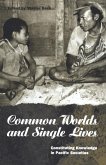This book seeks to enhance comparative understandings of ethnicity, to refine theories of nationalism, and to contribute to ongoing debates on multiculturalism, identity politics and creolization. Mauritius, an Indian Ocean island-state with a population of about one million, provides a fascinating focus for this comprehensive study of social identity and political culture. Fifteen languages are officially spoken on the island, and four world religions are represented, as well as a high number of ethnic groups. The author argues that the social importance of ethnicity depends not only on political and economic circumstances, but also on kinship organization, and shows how ethnicity is expressed through the idioms of language and religion. However, it is also shown how ethnic identity may be superseded by other forms of belongingness and politics in the contemporary age. Nationhood, gender, class and individualism are all examined for the role they play in social organization and the formation of collective identity. Multiethnic and peaceful, the pace of social change in Mauritius has been rapid throughout the 1980s and 1990s. The ways in which Mauritians negotiate the relationship between ethnic, national and other identities in forging a surprisingly stable and democratic society, and the peculiar tensions which arise in the interface between the ethnic and the non-ethnic, ought to be familiar to anyone concerned with the future of multiethnic societies.
Hinweis: Dieser Artikel kann nur an eine deutsche Lieferadresse ausgeliefert werden.
Hinweis: Dieser Artikel kann nur an eine deutsche Lieferadresse ausgeliefert werden.








